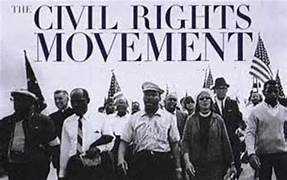Lyndon Baines Johnson has been credited with being a standout amongst the most critical figures in the common rights movement. Johnson has some distracters who trust that he was simply a corrupt government official who utilized the social equality issue when he understood the value of the "Dark Vote". Anyway, Johnson himself asserted to be a romantic who longed for making America an "Extraordinary Society". It was Johnson who put the presidential mark to the 1964 Civil Rights Act and the 1965 Voting Rights Act.

Lyndon Johnson's work for minorities started in 1928 when he got his first employment as a primary teacher; it was, obviously, right now an isolated school went to by just Mexican Americans. Johnson had 28 understudies who he reviewed were "buried in the ghettos", "lashed by bias" and "covered half-alive in lack of education". Johnson trusted that their solitary way out was by instruction and he influenced, harassed, persuaded and empowered his students, and they venerated him.
At the point when Johnson turned into a Congressman, he needed to pick up the minority vote thus he thought about utilizing a Mexican or Spanish-American to demonstrate his "gratefulness" of his Mexican supporters; pessimistic Texans called his conduct a reputation stunt. Numerous felt that any Texan who needed to speak to the isolated state needed to give off an impression of being a segregationist and his signal didn't. It was any way valuable to Johnson as it won him the minority vote and made him, a government official with national desire, look free from sectional preferences.
Johnson is that as it may, because of political convenience, was compelled to vote with his kindred Southern Democrats in Congress, against social liberties measures, for example, forbidding lynching, disposing of survey assesses and denying government subsidizing to isolated schools, measures which later would make up momentous enactment. As a representative, Johnson's restriction to Truman's social liberties program disturbed Texas blacks.
Johnson kept on staying watchful and pacified the Southern racists, for example, in 1956 when he slaughtered a civil rights charge in Congress. Once more, with regards to his Jekyll and Hyde position, he changed his feeling in 1957. While guaranteeing Texans that there was "no establishment" to bits of gossip he was advancing a social equality charge, and expressing he was "firmly and unalterably restricted to the constrained reconciliation of the races" he organized, however, weakened parts which would be hostile to southerners, the 1957 Civil Rights Act.
This weakening made kindred Southerner President Eisenhower's bill into a to a great extent unenforceable voting rights law. The piece of the bill, which enabled the government to advance coordination in schools, was lost, because of the threatening vibe BROWN and BROWN II had gotten in the South. Regardless of Johnson's weakening of the demonstration to make it just a token signal, the bill symbolized more noteworthy government enthusiasm for social equality and their upholding; it likewise made ready for more social liberties enactment. Johnson was likewise vital in the entry of Eisenhower's second Civil Rights Act in 1960.
Johnson moved toward becoming President of the USA, in November 1963 after the death of Kennedy. It was then that Lyndon Johnson declared his vision of an "Awesome Society" for America, with "a conclusion to neediness and racial bad form". Johnson felt he and Congress owed it to the late president to see his social liberties charge passed.